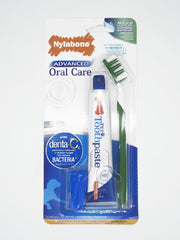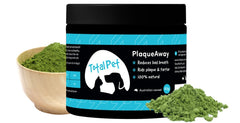
Are you a dog owner who wants to ensure the best dental health for your furry friend? Look no further! In this comprehensive guide, we will provide you with expert advice on preventing dental issues in Australian dogs. Your dog's oral hygiene is just as important as their overall well-being, and neglecting it can lead to serious health complications down the line.
The Australian Veterinary Dental Society have found that by the age of just 3 years, 80% of dogs are affected by periodontal disease and it is by far the most common of all diseases found in dogs.
From dental diseases such as gingivitis and periodontal disease to bad breath and tooth loss, we will cover it all. Our team of canine dental experts has gathered the most effective preventive measures, including proper brushing techniques, dental-friendly diets, and regular dental check-ups. Don't let dental issues ruin your dog's smile - follow our advice and ensure a healthy and happy canine companion for years to come.
The Importance of Dental Health for Dogs
Good oral hygiene is vital for maintaining the overall health and well-being of your furry friend. Just like humans, dogs can develop a variety of dental issues that can cause pain, discomfort, and even more serious health problems if left untreated. Dental diseases such as gingivitis and periodontal disease are common in dogs and can lead to tooth loss and systemic infections if not properly managed. Additionally, poor dental health can affect your dog's ability to eat and enjoy their food, leading to malnutrition and weight loss. Taking care of your dog's dental health is not just about keeping their teeth clean, but also about safeguarding their overall quality of life.
Regular dental care for dogs is essential to prevent and manage dental problems. By implementing a proper dental hygiene routine, providing a dental-friendly diet, and seeking professional dental care, you can significantly reduce the risk of dental issues in your Australian dog. Let's dive deeper into the common dental issues that affect dogs in Australia and the preventive measures you can take to keep your furry friend's smile healthy.
Common Dental Issues in Australian Dogs
Dental issues are prevalent among dogs in Australia, with many canines suffering from oral health problems at some point in their lives. The most common dental problems seen in Australian dogs include:
1. Gingivitis: Gingivitis is the inflammation of the gums and is often caused by the buildup of plaque and tartar on the teeth. It is characterized by red, swollen gums that may bleed easily. If left untreated, gingivitis can progress to more severe periodontal disease.
2. Periodontal Disease: Periodontal disease is a more advanced form of dental disease that affects the gums, periodontal ligaments, and the bone surrounding the teeth. It occurs when gingivitis is left untreated, leading to the formation of pockets between the gums and teeth, where bacteria thrive. This can result in tooth loss and even systemic infections, affecting your dog's overall health.
3. Tooth Decay: Tooth decay, also known as dental caries, is relatively rare in dogs compared to humans. However, it can still occur, especially in dogs that consume a diet high in sugar or have poor dental hygiene. Tooth decay can lead to pain, tooth loss, and the need for dental procedures such as extractions or root canals.
4. Bad Breath: While not a dental disease in itself, bad breath (halitosis) is a common sign of dental issues in dogs. It is often caused by the buildup of bacteria and food particles in the mouth, leading to an unpleasant odor. Persistent bad breath may indicate underlying dental problems that require attention.
Recognising the signs and symptoms of dental issues in your dog is crucial for early intervention and treatment. Let's explore the red flags that may indicate dental problems in your furry friend.
Signs and Symptoms of Dental Problems in Dogs
Dogs are experts at hiding their pain and discomfort, making it challenging to identify dental issues without proper observation. However, there are several signs and symptoms that may indicate your dog is experiencing dental problems. Keep an eye out for the following:
1. Bad Breath: As mentioned earlier, persistent bad breath can be a sign of dental issues in dogs. If your dog's breath consistently smells foul, it is essential to investigate the cause, as it may indicate underlying dental disease.
2. Difficulty Eating: If your dog suddenly starts having difficulty eating or shows a reluctance to chew on hard objects, it could be a sign of dental pain. Dental problems can make it painful for your dog to chew and may result in a decreased appetite or weight loss.
3. Drooling: Excessive drooling can be a sign of dental issues in dogs. If you notice your dog drooling more than usual or if their drool appears thicker or discolored, it may be time to check their oral health.
4. Visible Tartar and Plaque: Take a look at your dog's teeth and gums. If you notice a significant buildup of tartar and plaque, it is a clear indication that dental care is needed. Tartar appears as a yellow or brownish substance on the teeth, while plaque is a sticky, colorless film.
5. Bleeding Gums: Healthy gums should be pink and firm. If you notice bleeding, redness, or swelling of the gums, it may indicate gingivitis or periodontal disease. Gently lift your dog's lip to check their gum health regularly.
6. Pawing at the Mouth: If your dog is frequently pawing at their mouth or rubbing their face against furniture, it could be a sign of dental pain or discomfort. Dogs may exhibit this behavior to alleviate the discomfort they are experiencing.
If you observe any of these signs or suspect that your dog may be experiencing dental problems, it is crucial to consult with a veterinarian. Early detection and prompt treatment can help prevent the progression of dental issues and ensure your dog's oral health.
How to Prevent Dental Issues in Dogs
Preventing dental issues in Australian dogs requires a proactive approach to their oral hygiene. Here are some effective preventive measures you can take to keep your dog's teeth and gums healthy:
Dental Hygiene Routine for Dogs
 Establishing a regular dental hygiene routine is essential for maintaining your dog's oral health. Here's a step-by-step guide to help you get started:
Establishing a regular dental hygiene routine is essential for maintaining your dog's oral health. Here's a step-by-step guide to help you get started:
1. Brushing Your Dog's Teeth: Regular brushing is the cornerstone of a good dental care routine. Use a toothbrush and toothpaste specifically designed for dogs. Start by introducing your dog to the toothbrush and toothpaste gradually, allowing them to get used to the taste and sensation. Once they are comfortable, gently brush their teeth in a circular motion, focusing on the gum line. Aim to brush your dog's teeth at least three times a week, if not daily.
2. Choosing the Right Toothpaste: It's important to note that human toothpaste is not safe for dogs, as it contains ingredients that can be harmful if swallowed. Opt for a toothpaste formulated for dogs, which usually comes in flavors that are more appealing to them, such as poultry or peanut butter. This will make the brushing experience more enjoyable for both you and your furry friend.
 3. Introducing Dental Chews and Toys: Dental chews and toys can help keep your dog's teeth clean while providing them with mental stimulation and entertainment. Look for products that are specifically designed to promote dental health, such as those that help remove plaque and tartar or massage the gums. However, be sure to choose toys and chews that are appropriate for your dog's size and chewing habits to avoid any potential choking hazards.
3. Introducing Dental Chews and Toys: Dental chews and toys can help keep your dog's teeth clean while providing them with mental stimulation and entertainment. Look for products that are specifically designed to promote dental health, such as those that help remove plaque and tartar or massage the gums. However, be sure to choose toys and chews that are appropriate for your dog's size and chewing habits to avoid any potential choking hazards.
Dental-Friendly Diet for Dogs
A balanced and nutritious diet plays a significant role in maintaining your dog's dental health. Consider the following dietary recommendations to support your dog's oral hygiene:
1. Dry Food vs. Wet Food: Dry kibble such as Man's Best Grain-Free recipe can be beneficial for your dog's dental health, as the chewing action helps remove plaque and tartar from their teeth. Wet food, on the other hand, tends to stick to the teeth, increasing the risk of dental issues. If you primarily feed your dog wet food, consider incorporating dry kibble or dental treats into their diet to promote oral hygiene.
2. Dental-Friendly Treats: Treats can be an excellent way to reward your dog while contributing to their dental health. Look for dental chews or treats that have a texture designed to promote chewing and help remove plaque. Avoid treats that are high in sugar or contain artificial ingredients, as these can contribute to dental problems.
3. Water and food Additives: Some water additives are formulated to help prevent the accumulation of plaque and tartar in your dog's mouth. These additives can be added to your dog's drinking water to promote oral health. TotaPet PlaqueAway is a seaweed based dental health supplement that you sprinkle over your dog's meals each day. This is very effective at removing plaque, keeping gums healthy and maintaining fresh breath in your dog.
prevent the accumulation of plaque and tartar in your dog's mouth. These additives can be added to your dog's drinking water to promote oral health. TotaPet PlaqueAway is a seaweed based dental health supplement that you sprinkle over your dog's meals each day. This is very effective at removing plaque, keeping gums healthy and maintaining fresh breath in your dog.
Professional Dental Care for Dogs
While regular at-home dental care is crucial, professional dental care is equally important for maintaining your dog's oral health. Consider the following professional dental care options for your furry friend:
1. Regular Dental Check-ups: Schedule regular dental check-ups with your veterinarian to monitor your dog's dental health and catch any issues early on. During these check-ups, your veterinarian will perform a thorough examination, including dental cleanings, and may recommend further treatments if necessary.
2. Professional Dental Cleaning: Professional dental cleanings are typically performed under anesthesia to ensure a thorough cleaning and examination. During the cleaning, your veterinarian will remove plaque, tartar, and bacteria from your dog's teeth and perform any necessary dental procedures, such as extractions or root canals. Regular dental cleanings can significantly reduce the risk of dental issues and maintain your dog's oral health.
Dental Toys and Treats for Maintaining Oral Health
In addition to regular brushing and a dental-friendly diet, incorporating dental toys and treats into your dog's routine can help maintain their oral health. Here are some options to consider:
1. Dental Chew Toys: Chew toys that are designed to promote dental health can be a great addition to your dog's playtime. These toys are typically made of durable materials and have various textures that help remove plaque and massage the gums. Look for toys that are specifically labeled as dental toys.
2. Dental Treats and Bones: Dental treats and bones are designed to promote chewing, which can help remove plaque and tartar from your dog's teeth. However, it's important to choose treats and bones that are appropriate for your dog's size and chewing habits to prevent any potential choking hazards.
Tips for Introducing Dental Care to Your Dog
Introducing dental care to your dog may take some time and patience, especially if they are not accustomed to having their teeth brushed or examined. Here are some tips to help you ease your dog into a dental care routine:
1. Gradual Introductions: Start by introducing your dog to the toothbrush and pet friendly toothpaste gradually. Allow them to sniff and explore the dental products before attempting to brush their teeth. This will help them become familiar with the tools and reduce any anxiety they may have.
2. Positive Reinforcement: Use positive reinforcement techniques, such as treats and praise, to reward your dog during the dental care process. This will help create a positive association with dental care and make the experience more enjoyable for your furry friend.
3. Take it Slow: Take small steps and gradually increase the duration of your dental care sessions. Start with short brushing sessions and gradually increase the time as your dog becomes more comfortable. Remember to be patient and understanding with your dog throughout the process.
By following these tips and being consistent with your dental care routine, you can ensure a healthy and happy smile for your Australian dog.
Keeping Your Dog's Smile Healthy and Bright
Your dog's dental health is a crucial aspect of their overall well-being. By implementing a comprehensive dental care routine, including regular brushing, a dental-friendly diet, and professional dental check-ups, you can prevent dental issues in your Australian dog. Remember to be observant of any signs or symptoms of dental problems and consult with your veterinarian for proper diagnosis and treatment.
A healthy and happy smile starts with you. Take the necessary steps today to ensure your furry friend's dental health and enjoy a lifetime of joyful moments together. Your dog will thank you with their bright and beaming smile!






